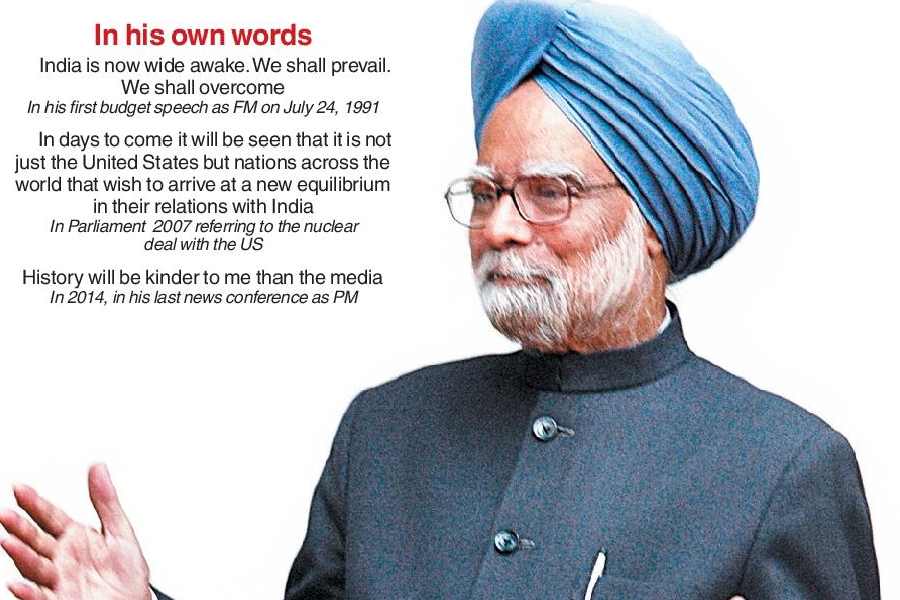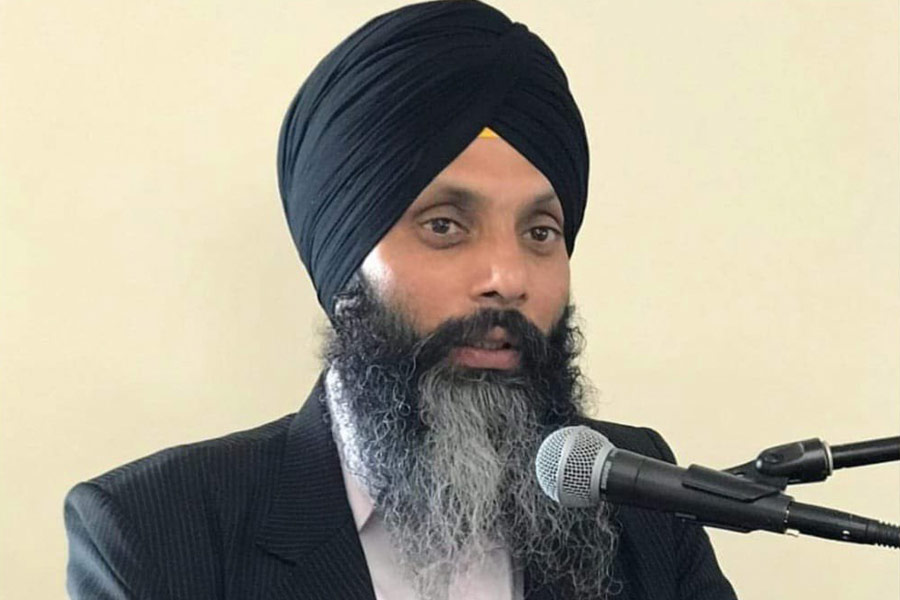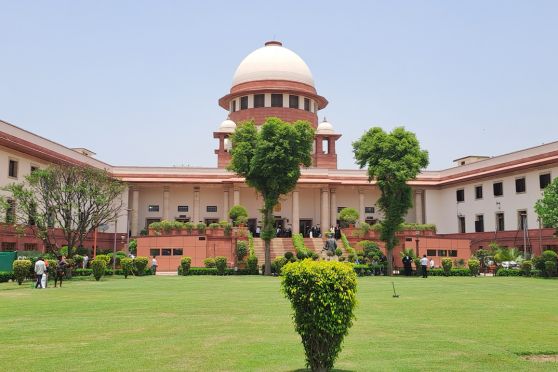The most underrated politician and the most overestimated economist -- that is how Dr. Y.K. Alagh had once described Manmohan Singh. Indeed, to the outside world, for the longest time, politician Manmohan Singh was no more than Sonia Gandhi's cipher. In reality, though, she was in awe of him. She always acknowledged his intellect and experience and trusted his judgment.
This was evident in the manner in which she backed him on the nuclear deal in 2008. Instead of siding with the Left leadership, which was offering itself as a "trusted friend" and a "natural ally", Sonia went along with Singh because she trusted his judgment. This was one of the reasons why the division of power between the Congress president and the Prime Minister worked from 2004 right through to 2014. Singh followed Sonia's broad agenda, liberal economics with an inclusive approach.
Paradoxical as it may sound, Sonia had scant regard for the traditional Congressmen. It was perhaps because of the P. V. Narasimha Rao experience of 1991-96, when the otherwise harmless looking Rao turned Chanakya after becoming the Congress president and then Prime Minister. Rao sidelined the Nehru Gandhi legacy and loosened 10 Janpath's hold over the grand old party. So, in 2004, when it was time to pick a prime ministerial candidate, Sonia ignored Pranab Mukherjee, Arjun Singh, K. Natwar Singh and Shivraj Patil and picked Singh, who was otherwise viewed as a Rao protégé.
Singh had a lifelong ambition to revisit Gah, a village close to Islamabad in Pakistan where he was born. He could never do so on account of bitter ties with the neighbour.
The story of Singh's evolution from an economist and technocrat is a fascinating one. He was working at the UNCTAD at the United Nations under the famous economist Raul Prebisch, when he received an offer to join Delhi School of Economics as a lecturer. This was sometime in 1969. When Singh told Prebisch, the economist was somewhat taken aback and wondered why a brilliant economist like him would give up a lucrative UN job and return to India. "You are being foolish," Prebisch is said to have told Singh. After a pause and contemplation, Prebisch added, "...but, sometimes in life, it is wise to be foolish." Indeed, it was. Returning to India made Singh a politician among politicians.
Interestingly, it was not Sonia alone who saw a lot of merit in the good doctor. Singh enjoyed close proximity to several prime ministers -- Chaudhary Charan Singh, Indira Gandhi, Chandrashekhar and Rao.
As for Sonia Gandhi's trust in him, it was in sharp contrast with her husband Rajiv Gandhi's outlook.
In 1985, Prime Minister Rajiv Gandhi had taken a very urban-centric vision of development and restructuring of the economy. Singh was, at that point in time, deputy chairman of the Planning Commission, and Rajiv, as Prime Minister, was its ex-officio Chairman. C.G. Somiah, a former Union home secretary who retired as the comptroller and auditor general of India, has recorded a famous incident from those days in his autobiography The Honest Always Stand Alone. Rajiv had described the Planning Commission under Singh as a "bunch of jokers" bereft of any modern ideas of development. Rajiv's "bunch of jokers" remark had reportedly hurt Singh and the economist had contemplated stepping down. Somiah claims he convinced Manmohan to stay on. He writes, "I sat with him (Singh) for nearly an hour and told him not to take the extreme step and blamed the Prime Minister's ignorance for this behaviour. I further advised that since the Prime Minister was young and inexperienced, it was our duty to educate him rather than abandon him. I was finally able to convince him not to act hastily and that was my good deed for the day." Nevertheless, Singh remained subdued and sidelined for most part of the Rajiv regime. On the morning of June 22, 1991, a Saturday, Singh received a phone call at his Bahadur Shah Zafar Marg office -- he was chairman of the University Grants Commission. On the other end was Rao, who was scheduled to take oath as Prime Minister that afternoon. He told Singh: "What are you doing there? Go home and change, and come straight to Rashtrapati Bhavan." On June 24, 1991, Singh held his first press conference as the country's finance minister to announce the scope of the impending reforms. He promised to clear the "cobwebs of unnecessary control" that had impeded economic development and decreed that "the world has changed, and the country must also change".
Singh's first budget gave him many lessons in realpolitik. His special gesture and unprecedented move to dole out Rs 100 crore grant to a private trust -- Rajiv Gandhi Foundation -- generated controversy. The Opposition asked how a private trust was being given hard-earned taxpayer's money. Sonia, Priyanka, Rahul and Amitabh Bachchan, all trustees of the foundation then, were aghast. The move to grant Rs 100 crore boomeranged and withdrawing it would have made matters worse. Rao asked Singh to clarify the government's position to Sonia.
Singh called on Sonia, but as he sat facing her, he could not muster the courage to come to the point. He kept speaking in general terms till tea was served. Finally, he began apologising, explained how he had no intention of embarrassing her or belittling the cherished memory of Rajiv, and then went on to explain the government's dilemma.
The grant was withdrawn after Sonia wrote a letter to Rao. It said: "While we thank you personally and your colleagues for this most generous gesture, it would be best if the government instead identified suitable projects and programs and fund them directly and thus honour the memory of my husband." Manmohan Singh's journey as a politician had begun. When Sonia took over as party chief from Sitaram Kesri, one of the key decisions that she took was to project Singh as a figurehead. It proved to be a good strategy simply because if there was one person in the Congress, who enjoyed good rapport and respect throughout the country without winning an election, then it was Manmohan Singh. Sonia gave him a Lok Sabha ticket to contest from South Delhi. Singh lost to BJP's Vijay Kumar Malhotra by 30,000 votes. Sonia later came across some evidence that showed the dubious role played by some senior Congress leaders in ensuring Singh's defeat. Singh's detractors from within perceived him as a threat to their own position in the party hierarchy.
Due to his proximity to Sonia, Singh had become an eyesore for the traditional topiwallahs, who viewed the technocrat with suspicion. A committee headed by A.K. Antony, investigating the 1996 and 1998 general elections, concluded that Singh's economic reforms had led to the downfall of the party and resulted in the Congress's poor performance. Sonia, however, did not agree and disregarded the Antony panel reports. Singh was appointed leader of the Opposition in the Rajya Sabha. At the party forum, Singh intensely disliked the idea of being grilled by people, who had no knowledge of the fundamentals of economics. His skirmishes with Congress leaders left him a disillusioned man. At one juncture, he even toyed with the idea of quitting to take up academics and track-two diplomacy, but Sonia persuaded him to stay on, promising to defend his policies.
Between 2004 and 2014, the UPA, which had come into being hurriedly and under extraordinary circumstances following Sonia's act of renunciation in 2004, functioned well under Manmohan, but the coalition faced innumerable challenges from within and outside. In the larger context, it worked more like a bureaucratic machine than a political conglomerate. There were many lacklustre performances by some of the key portfolio holders, ministers frequently differed with each other, sidelined juniors and cared little for accountability -- a basic feature of parliamentary democracy.
The row over the nuclear deal saw a pragmatic side of Singh. In fact, from August 2007 to July 2008, Singh-Sonia teamed up in a shrewd and decisive manner to checkmate their opponents. The N-deal crisis saw Singh giving a rare and candid interview to Manini Chatterjee of The Telegraph and told her: "I told them [the Left] that it is not possible to renegotiate the deal. It is an honourable deal, the Cabinet has approved it, we cannot go back on it. I told them to do whatever they want to do, if they want to withdraw support, so be it."
The beginning
- Born on September 26, 1932, in Gah in present-day Pakistan. One of 10 children of Gurmukh Singh and Amrit Kaur. Father is a dry fruits merchant, who moved to Amritsar well before Partition.
Scholar...
- 1948 Matriculates from Panjab University, then graduates with economics honours and thereafter, completes his master's. Takes off for Cambridge where he earns a first class honours degree in economics and while there he also wins the Adam Smith prize and is elected Wrenbury scholar.
- By 1957, he is back in India and teaching full-time at his alma mater. Gets married in 1958, three daughters are born.
- 1962 Gets his DPhil in economics from Nuffield College at Oxford University.
- From 1966-69, he is with the UNCTAD and after that joins the Delhi School of Economics as a professor.
Bureaucrat
- 1972 Begins a new innings as bureaucrat. He is at the time 40. 1972-76 Economic adviser to ministry of finance -- at the time, Indira Gandhi was Prime Minister; 1976-80 secretary in the ministry of finance; 1980 Member secretary of the Planning Commission; 1982-85 RBI governor, 1985-87 head of the Planning Commission; 1987-1990 secretary-general of the South Commission; 1990 Economic adviser to Prime Minister Chandra Shekhar, and 1991 Chairman of the University Grants Commission. Somewhere in between, is awarded the Padma Vibhushan (1987).
Politician
- June 1991 His academic and bureaucratic avatars behind him, the 60-year-old "extinguished economist" (as he likes to call himself) is reborn a politician. Singh is the boss of UGC when one morning he gets a call from Prime Minister P.V. Narasimha Rao asking him to report to the swearing-in ceremony. At a time when the economy is in a shambles, inflation at an all-time high, Rao chooses Singh as his man to handle finance over worthy others. (Pranab Mukherjee for one is said to have eyed the job.) Reasons cited in Singh's favour: he is a specialist and a clean man.
- Starts off on an honest if not-too-popular note when he announces that it is impossible to return to the prices of most commodities of the previous year, which is essentially what the Congress-I promised people when it went to polls.
- In the 1970s he was working to implement socialist policies, but as FM he starts working to reverse those. His experience at the South Commission, seeing how different developing countries performed, has changed him. Subramanian Swamy comments how the Leftist has now become a laissez faire economist.
- In his first month as FM he devalues the rupee, announces a new trade policy, and a new industrial policy, and presents "the first reform-led budget". A government-controlled economy is finally set free and Singh comes to be hailed as the "architect of a new India" and the "face of foreign direct investment in India".
- Criticism abounds. Cartoonist Laxman draws Singh as a little bird perched on Nehru's statue, Panditji's head covered with bird dropping. Others lampoon Singh as IMF's bride bringing along a 250 million market as dowry. No one really expects him to survive the job though he has more critics within the coalition than in the Opposition. At some point, Atal Bihari Vajpayee advises him to develop a thicker skin.
- December 1992 Ayodhya happens, followed by the Bombay blasts and economic reforms lose pace as well as place in the list of priorities. There was the securities scam from earlier that year, a stock market scam involving trader Harshad Mehta. A joint parliamentary committee was set up to investigate it. Sixteen months later, it submits its report, laying most of the blame at Singh's door. There is no concrete proof though; nevertheless Singh offers his resignation to Rao. The PM, however, stands by his FM.
Electoral debut
- 1999 Makes his electoral debut as the Congress candidate from South Delhi. Loses to BJP's V.K. Malhotra. From 1991 to the end, he remains a member of the Upper House of Parliament.
- May 22, 2004 The many times reborn man is anointed the 13th Prime Minister. Earlier, Sonia Gandhi, who refuses the post despite steering the Congress to a spectacular victory, tells the press: "The nation is safe in the hands of Dr Manmohan Singh".
- Singh's first term as PM eventually became synonymous with the Indo-US nuclear deal, but during this term his achievements include the NREGA, the NRHM, the Right to Information Act, the UIDAI.Yes, on the nuclear deal, Singh stands his ground. He once told the press, "The nuclear deal will do for Indian technology what the 1991 reforms did for the Indian economy". In 2008, when the Left allies threaten to withdraw support to UPA I over the deal, Singh bites the bullet. He finds a new and ready ally in the Samajwadi Party and goes on to win the trust vote in Parliament. Just before the 2009 elections, he undergoes a 14-hour bypass surgery. He recovers, the elections are fought and won, and UPA II is installed with Singh as king, but the good run seems to be petering to an end. Scams come out of the woodwork, the common charge against him is "policy paralysis", and the very qualities that had once endeared him to his constituency -- mild manners, silent, soft-spoken, honest -- now feed the anti-incumbency factor.
- After the Congress's defeat in 2014, steps down. In his last public address, tells the nation: "I owe everything to this country, this great land of ours where I, an underprivileged child of Partition, was empowered enough to rise and occupy high office. It is a debt that I will never be able to repay."
- Ten years later, in April of 2024, Singh retires from the Rajya Sabha, thus ending his 33-year stint as a Parliamentarian.










